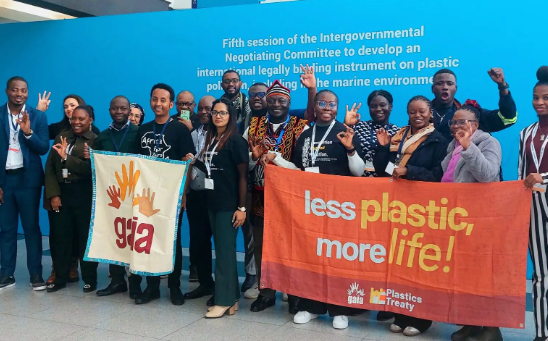 GAIA Africa hosted an online media briefing for African journalists on July 24, 2025 / SCREENGRAB
GAIA Africa hosted an online media briefing for African journalists on July 24, 2025 / SCREENGRABAfrican civil society groups are calling for bold and urgent action to tackle plastic pollution ahead of crucial international negotiations on the Global Plastics Treaty.
At an online media briefing on July 24, hosted by GAIA Africa, environmental activists urged journalists across the continent to amplify Africa’s united demand for a strong, binding treaty that addresses the full life cycle of plastics — from production to disposal.
“We have the evidence. We have the momentum. What we’re missing is the commitment to act,” said Merrisa Naidoo, GAIA Africa’s Plastics Programme Manager. “Now, more than ever, we need courageous leadership.”
The call comes just days before the resumed fifth session of the Intergovernmental Negotiating Committee (INC-5.2), which aims to hammer out the details of the world’s first global agreement to end plastic pollution.
African leaders have long held a strong position in the treaty process. Through the African Ministerial Conference on the Environment (AMCEN) Decision 19/2, the continent established a clear negotiating mandate focused on protecting people and the environment from the dangers of plastics.
Speakers from across Africa highlighted plastic pollution not just as an environmental crisis but as a threat to human rights and public health.
“In my country, Ethiopia, we are witnessing a growing surge in petrochemical infrastructure linked to plastic production. This is where harm begins, and where justice must be rooted,” said Eskedar Awgichew of EcoJustice Ethiopia.
In Kenya, concerns about toxic chemicals and the impact on children and food systems were echoed by Dorothy Otieno of the Centre for Environment Justice and Development (CEJAD). “This treaty is fundamentally African,” she said.
Key demands from civil society include phasing out toxic chemicals in plastics, reducing production at the source, and establishing a solid financial mechanism to support countries in implementing treaty commitments.
GAIA — a global alliance of over 1,000 grassroots groups in 90 countries — is pushing for systemic change and environmental justice. Its members believe the upcoming negotiations present a once-in-a-generation chance to deliver a global solution to a global problem.
The push for a treaty gained momentum in March 2022 when the UN Environment Programme (UNEP) announced the adoption of a resolution to develop the world’s first treaty targeting plastic pollution.
Known as Resolution 5/14, it was passed unanimously at the United Nations Environment Assembly (UNEA 5.2).
Unlike national regulations, the Global Plastics Treaty aims to tackle global challenges — such as unchecked plastic production, cross-border pollution, and international financing — that no single country can solve alone.
For African civil society, the message is clear: the time to act is now — and the world must not waste this historic opportunity.












